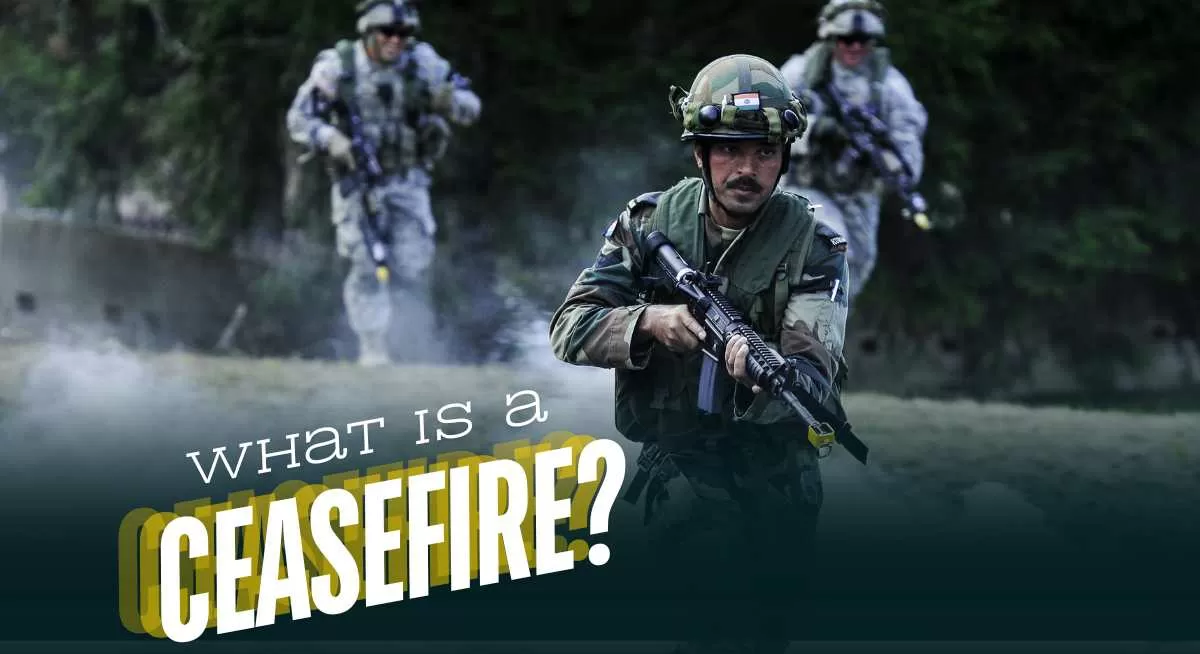A ceasefire is a negotiated agreement between opposing parties, generally nations or groups of armed individuals, to temporarily suspend all fighting and military activities. It is generally established to provide a setting that is conducive to peace negotiations, talks, or humanitarian endeavors like the evacuation of injured soldiers. Ceasefires may be unilateral or mutually agreed upon and are an essential step toward the resolution of conflict or violence within a conflict area.
What is a Ceasefire?
A ceasefire is a mutual commitment to end combat and military activities for a particular duration and in a particular region. It provides parties with an opportunity to talk, negotiate peace, or undertake humanitarian operations.
Also Read | What is the Indus Water Treaty? Check the history and significance of this agreement
Although humanitarian law promotes ceasefires to allow relief and prisoner exchanges, the driving force is generally strategic, allowing regrouping or diplomatic negotiations. Ceasefires can be short-term and can develop into longer-term peace accords or armistices.
When is a Ceasefire Established?
Ceasefires are usually established following escalations or protracted conflict when both sides perceive benefits from halting hostilities. They can follow intense fighting, high casualties, or diplomatic pressure from the international community. Ceasefires are frequently agreed upon prior to official peace negotiations or talks.
They can be established by either party or by third-party mediation.
Also Checkout: History of Pakistan Occupied Kashmir (POK)
Protocol Followed for Ceasefire
The process is usually conducted through communication between the top military commanders or appointed representatives, for example, Directors General of Military Operations (DGMO).
- Terms are agreed on by both parties, including the timing and scope (land, air, sea) of the hostilities' cessation.
- Instructions are given down the chain of military command to execute the ceasefire.
- Monitoring arrangements can be put in place to check compliance.
- Follow-up negotiations are arranged to talk about additional de-escalation or peace processes.
Current Ceasefire Situation Iran and Israel (May 2025)
The present state of ceasefire between Israel and Iran as of June 24, 2025, is intricate and a little inconsistent according to recent developments:
US President Donald Trump has stated that a ceasefire between Iran and Israel is already in place, calling on both sides not to break it. The US brokered this ceasefire and Israel allegedly agreed to it only if Iran would end its attacks against Israeli soil.
Israel formally embraced the ceasefire following its assertion of "tremendous success" in its war against Iran, saying it has accomplished all of its war objectives including neutralizing near-term nuclear and missile threats, gaining aerial superiority over Tehran, and causing extensive damage to Iranian military command.
In defiance of Trump's declaration, Iranian authorities have dismissed the reports of ceasefire. Iranian semi-official media and officials have said that no ceasefire proposal was extended by Iran and dismissed Trump's announcement as lies to divert public attention. Tehran has signaled preparedness to pursue reciprocal military action if needed.
Within the hours of the ceasefire declaration, Iran had attacked southern Israel by missile, causing casualties. Israel reported several missile bombardments from Iran even after the ceasefire went into effect, with at least three to five Israelis dead and several injured.
Conditions on the ground are still tense, with Israeli defense systems still operational and reported missile strikes. Iran is said to have launched its final round of missiles at the last moment before the ceasefire came into effect, though overall compliance with the ceasefire is doubtful in light of continuing hostilities.
The ceasefire seems to be a delicate and perhaps slow process, each side having a different narrative: Israel and the US projecting it as efficient and negotiated, yet Iran refusing to admit any formal ceasefire and expressing willingness to resume combat if provoked.
Briefly, although a ceasefire between Israel and Iran brokered by the US has been declared and accepted by Israel, Iran has officially rejected the claims of ceasefire and hostilities, such as missile attacks, have persisted, rendering the ceasefire situation in its present form unstable and precarious
